Horse Shoe Spread
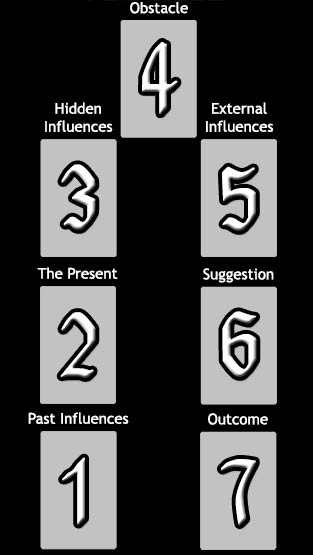
Difficulty: Easy
The Horse Shoe is a classic tarot spread. It is more advanced than the three-card reading, yet simpler than most other spreads. It is a versatile method that can be used for most queries, though there are other spreads which would go into more depth. Like the simple Past, Present, and Future spread, it contains these cards in positions #1, #2, and #7, but also has four other tarot cards that help the reader understand how to deal with the future better. The cards are to be read as follows:
- The Past: Past events affecting the question.
- The Present: The current state or approaching influence.
- Hidden Influences: Things the reader may not be aware of (or barely be aware of).
- Obstacles: This is the challenge: obstacles may be avoided or may have to be dealt with.
- External Influences: Attitudes and thoughts regarding people around the reader.
- Suggestions: Recommended course of action.
- Outcome: The result of following the suggestions.
Your Horse Shoe Reading
Obstacle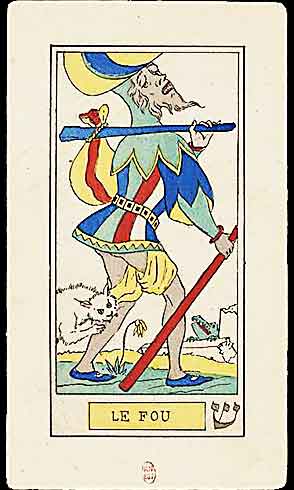 0 – The Fool |
||
Hidden Influences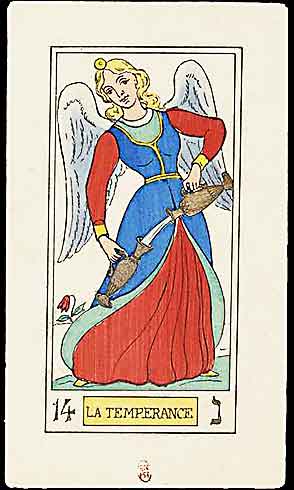 XIV – Temperance |
External Influences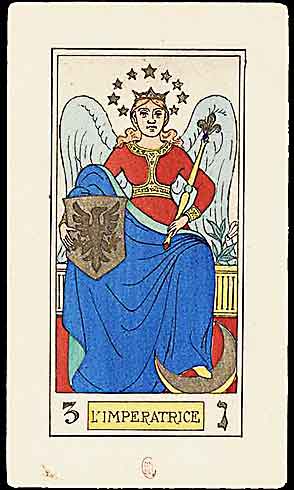 III – The Empress |
|
The Present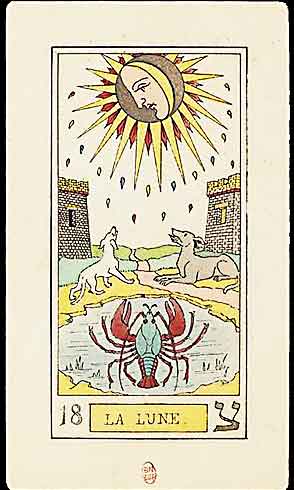 XVIII – The Moon |
Suggestion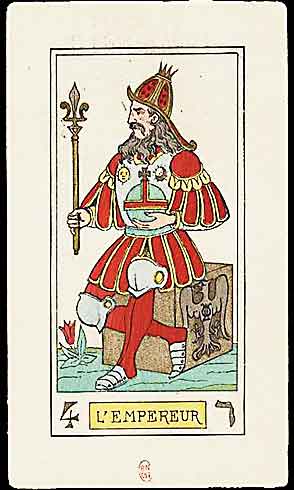 IV – The Emperor |
|
The Past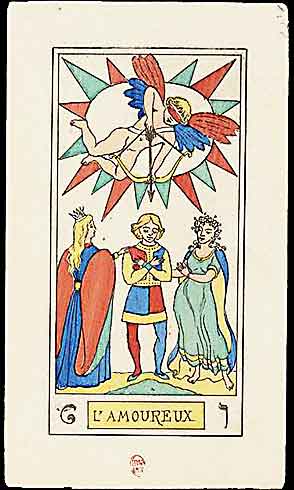 VI – The Lovers |
The Outcome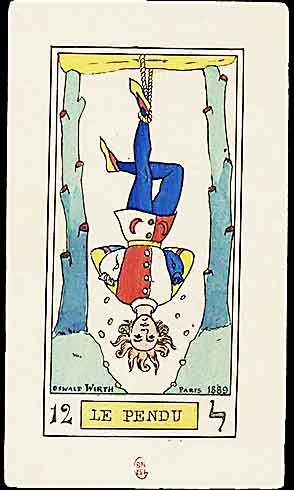 XII – The Hanged Man |

The Past Card represents past events that are affecting the question.
VI – The Lovers
The Lovers represents choice, duality, and the connections that shape our lives. This card often signals a critical decision between love and duty, passion and responsibility.
Symbolism: A young man stands between two women, representing virtue and temptation, while a winged figure above aims a bow and arrow, guiding his choice. The lush background reflects the complexity and growth that relationships bring.
In Relationships: Choices in relationships, including romantic triangles, commitment, or the deepening of bonds.
In Work: A crossroads where personal values must be aligned with career decisions.
Spiritually: A call to balance inner conflicts and unite dualities in the quest for harmony.
When ill-dignified: Indecision, infidelity, or superficiality in relationships.

The Present Card represents the current state or immediately approaching influence.
XVIII – The Moon
The Moon signifies illusion, intuition, and the subconscious mind. It represents the mystery of the unknown, hidden fears, and the need to trust inner guidance while navigating uncertainty.
Symbolism: The Moon is depicted with two dogs howling at the moon, symbolising the pull of primal instincts. A crayfish crawls from the water, representing the subconscious emerging into consciousness. The path leads towards a distant horizon, symbolising the journey through confusion to clarity.
In Relationships: Illusions in relationships, emotional confusion, or hidden feelings. Trust your intuition to navigate these uncertain waters.
In Work: Uncertainty or the need to trust your instincts. Hidden factors may influence the situation.
Spiritually: A time to confront fears, listen to your inner voice, and seek clarity in moments of doubt.
When ill-dignified: Deception, illusion, or being misled by false hopes or unclear situations.

Hidden Influences - Things that you may not be aware of, or barely be aware of.
XIV – Temperance
Temperance represents balance, moderation, and the art of harmonising opposites. This card suggests a period of a careful blending of energies, creating harmony between diverse aspects of life.
Symbolism: Temperance is shown pouring liquid between two cups, symbolising the blending of forces or energies. Her wings suggest a spiritual connection, and her alchemical knowledge signifies a harmonious outcome. The card teaches the importance of moderation.
In Relationships: A balanced, harmonious relationship or the need for patience and moderation in love.
In Work: A time to blend different skills or approaches to find success. Collaboration and diplomacy are key.
Spiritually: A call for balance, peace, and alignment between the spiritual and material realms.
When ill-dignified: Excess, imbalance, or an inability to find middle ground.

Obstacle - This is the challenge.
0 – The Fool
The Fool represents freedom, spontaneity, and new beginnings. This card signifies the start of an adventurous journey, full of potential but also uncertainty. He reminds us to embrace the unknown with optimism and an open heart.
Symbolism: The Fool carries a staff and a small sack, symbolising untapped potential and the lessons to be learned. The playful animal at his feet represents instinct, loyalty, and sometimes, the forces that pull us in conflicting directions. His carefree attitude invites a leap into the unknown.
In Relationships: New romantic beginnings, playfulness, and spontaneity, but be wary of impulsive actions.
In Work: A time for exploration, openness to unconventional opportunities, and embracing the unfamiliar.
Spiritually: Embarking on a journey of self-discovery, embracing the unknown with faith.
When ill-dignified: Recklessness, lack of foresight, and the dangers of ignoring consequences.

External Influences - Attitudes about this situation from people around the querent.
III – The Empress
The Empress embodies creativity, fertility, and nurturing energy. She symbolises the fruitful aspects of life, from creativity to personal growth, and encourages abundance in all forms.
Symbolism: Adorned with a crown of stars, she sits in a lush, fertile garden, holding a sceptre and shield. These symbols signify both authority and protection. The crescent moon beneath her feet connects her to cycles of intuition and growth.
In Relationships: Nurturing love, emotional bonds, or the creation of something new in a relationship, such as a family.
In Work: Success in creative ventures, productive work, and harmony.
Spiritually: Connection with natural and cosmic cycles, alignment with divine timing.
When ill-dignified: Stagnation, overindulgence, or the misuse of creative energy.

Suggestion - The recommended course of action.
IV – The Emperor
The Emperor embodies structure, authority, and rational leadership. He embodies the power of order and disciplined action, urging us to establish strong foundations and clear boundaries in all aspects of life.
Symbolism: Adorned with a regal crown and seated on an imposing throne, the Emperor exudes control and stability. His detailed, authoritative attire and the subtle inclusion of esoteric symbols speak to a mastery over both the material and the mystical realms, emphasising the importance of balance between external order and inner wisdom.
In Relationships: The Emperor encourages healthy dynamics marked by protection, responsibility, and mutual respect. His energy suggests that strong leadership and clear boundaries can foster trust and stability within partnerships.
In Work: Success in professional endeavours comes through strategic planning, disciplined execution, and the establishment of order. The Emperor's influence highlights leadership, authority, and the ability to structure one's environment for optimal productivity.
Spiritually: Embodying a union of earthly power and cosmic order, the Emperor invites you to align your will with higher universal principles. His guidance emphasises the importance of self-discipline and integrity on the path to spiritual growth.
When ill-dignified: A misaligned Emperor may indicate an overbearing or inflexible attitude, where authority turns into domination and rigidity stifles creativity and progress.

The Outcome - What will happen if the suggestion is followed.
XII – The Hanged Man
The Hanged Man symbolises suspension, sacrifice, and a shift in perspective. This card represents moments when one must release old beliefs or attachments to gain deeper insight and understanding.
Symbolism: The Hanged Man is depicted hanging upside down, suspended by one foot. His serene expression reflects acceptance and surrender, as he finds wisdom through a change in perspective. His hair resembles a crown symbolising enlightenment and the illumination gained through this pause.
In Relationships: A period of reflection, where relationships may need to be reassessed. It could also suggest a sacrifice for love or personal growth within relationships.
In Work: A time for letting go of old ways of thinking, re-evaluating goals, or waiting patiently for a shift in circumstances.
Spiritually: A time for surrender and spiritual enlightenment, achieved through a different perspective.
When ill-dignified: Stagnation, indecision, or an unwillingness to make necessary sacrifices for growth.